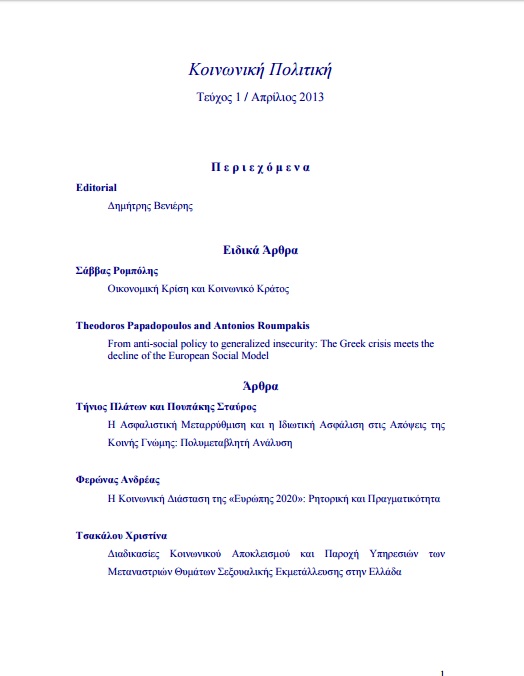Ικανοποίηση με τις Συνθήκες Εργασίας, Οργάνωση της Εργασίας και Γνώση, 1995-2010

Περίληψη
Εξετάζονται τα δεδομένα των τεσσάρων τελευταίων κυμάτων (1995-2010) του European Working Conditions Survey που διενεργεί το European Foundation for the Improvement of Living and Working Conditions αναφορικά με την ικανοποίηση των εργαζομένων με τις συνθήκες εργασίας τους, στην Ελλάδα και στην Ευρωπαϊκή Ένωση (ΕΕ15). Διερευνώνται οι διαφορές μεταξύ χωρών αλλά και μεταξύ επιμέρους ομάδων απασχολούμενων. Διερευνάται η σχέση μεταξύ της ικανοποίησης με τις συνθήκες εργασίας και των διαρθρωτικών χαρακτηριστικών της απασχόλησης, καθώς και μεταξύ της ικανοποίησης και των διαφορετικών μορφών οργάνωσης της εργασίας. Αναδεικνύεται η ιδιαίτερη σημασία της εκμάθησης νέων πραγμάτων στη δουλειά για την ικανοποίηση με τις συνθήκες εργασίας.
Λεπτομέρειες άρθρου
- Πώς να δημιουργήσετε Αναφορές
-
Γαβρόγλου Σ. (2017). Ικανοποίηση με τις Συνθήκες Εργασίας, Οργάνωση της Εργασίας και Γνώση, 1995-2010. Κοινωνική Πολιτική, 1, 89–111. https://doi.org/10.12681/sp.10549
- Τεύχος
- Τόμ. 1 (2013)
- Ενότητα
- Άρθρα

Αυτή η εργασία είναι αδειοδοτημένη υπό το CC Αναφορά Δημιουργού 4.0.
Οι συγγραφείς των άρθρων που δημοσιεύονται στο περιοδικό διατηρούν τα δικαιώματα πνευματικής ιδιοκτησίας επί των άρθρων τους, δίνοντας στο περιοδικό το δικαίωμα της πρώτης δημοσίευσης. Άρθρα που δημοσιεύονται στο περιοδικό διατίθενται με άδεια Creative Commons 4.0 και σύμφωνα με την άδεια μπορούν να χρησιμοποιούνται ελεύθερα, με αναφορά στο/στη συγγραφέα και στην πρώτη δημοσίευση για μη κερδοσκοπικούς σκοπούς και με δικαίωμα τροποποίησης μόνον με παρόμοια διανομή (αν αναμείξετε, τροποποιήσετε, ή δημιουργήσετε πάνω στο υλικό, πρέπει να διανείμετε τις δικές σας συνεισφορές υπό την ίδια άδεια όπως και το πρωτότυπο).


